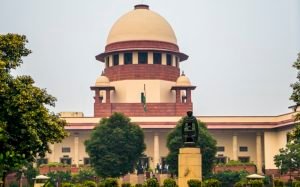The case involves Mahesh Chand (deceased, represented by LR(s)) as the appellant-landlord and Brijesh Kumar & Ors. as the respondent-tenants. A registered agreement was made on July 31, 1970, for a portion of land to be rented at ₹150/- per month for the purpose of setting up an Indian Oil petrol pump, clearly a non-agricultural use. The tenants’ predecessor-in-interest failed to pay rent regularly from July 1, 1972, leading the appellant to file a suit for eviction and recovery of arrears in 1974.
Jurisdiction Challenge: The tenants’ predecessor-in-interest filed an application claiming the Civil Court lacked jurisdiction, asserting the land was agricultural and only a Revenue Court could hear the matter.
Trial Court Ruling: The Trial Court rejected the tenants’ application on August 14, 1976, holding that since the land was let out for a non-agricultural purpose (petrol pump), the Civil Court had jurisdiction. The Trial Court later decreed the suit for possession and arrears of rent on November 30, 1981.
Appellate Rulings:
The First Appellate Court reversed the Trial Court’s decision, concluding that the Civil Court lacked jurisdiction because the land was not declared non-agricultural under Section 143 of the UPZALR Act.
The High Court partially accepted the appellant’s second appeal but still ordered the return of the plaint under Order VII Rule 10 of the Code of Civil Procedure (CPC), instructing presentation before a competent jurisdiction, based on the absence of a Section 143 declaration.
Crucial Development: During the pendency of the litigation, initial approval under Section 143 of the UPZALR Act for non-agricultural use was granted on December 10, 1975 (while the suit was pending). After further litigation, the land was finally declared non-agricultural on March 14, 1986, by the Deputy Collector, Khurja. This final declaration attained finality and was unchallenged. Notably, neither the First Appellate Court nor the High Court took notice of this development.
Law Involved
Code of Civil Procedure, 1908 (CPC): Specifically, Order VII Rule 10, concerning the return of a plaint for presentation to the proper court.
The Uttar Pradesh Zamindari Abolition and Land Reforms Act, 1950 (UPZALR Act):
Section 143: Pertains to the declaration of land as non-agricultural.
Section 145: Deals with the registration of declarations made under Section 143.
Indian Registration Act, 1908: Referenced in relation to Section 145 of the UPZALR Act.
Reasoning
The Supreme Court provided the following key reasoning:
Appeals as Continuation of Proceedings: The Court affirmed that an appeal is a continuation of proceedings, and any developments during the pendency of an appeal or suit that go to the root of the case must be taken into account to avoid multiplicity of litigation.
Nature of Land and Jurisdiction:
From the very beginning, the land was taken for a non-agricultural purpose (setting up a petrol pump) through a registered tenancy agreement. The tenants had obtained all necessary permissions for this commercial use.
The land was finally declared non-agricultural on March 14, 1986, during the pendency of the first appeal, a fact that was undisputed and attained finality.
The Court found that the First Appellate Court and the High Court erred by failing to consider this crucial development, despite the declaration having been made well before their respective judgments.
Once the land is declared non-agricultural, the Revenue Court loses jurisdiction, and the Civil Court is the competent forum to entertain the suit.
Registration under Section 145 UPZALR Act: The Court rejected the respondent’s argument that the Section 143 declaration was invalid due to non-registration. Section 145 of the UPZALR Act places the duty of forwarding the declaration for registration on the Assistant Collector-in-charge, not on the landowner (appellant). This registration is a mere procedure and is to be made free of cost. Therefore, the appellant cannot be deprived of the benefits of the declaration due to any deficiency on the part of the officers.
Estoppel: The tenants’ argument regarding the agricultural nature of the land was considered “misconceived” given they knew the land’s purpose was commercial from day one and had obtained permissions for a petrol pump.
Holding
The Supreme Court allowed the appeal, finding merit in the appellant’s submissions.
The impugned judgment and decree passed by the High Court were set aside.
The case was remitted back to the First Appellate Court to consider and decide the appeal on its merits, as the controversy’s merits had not been dealt with by the First Appellate Court or the High Court previously.
The First Appellate Court was directed to hear and decide the appeal within six months from the date of receipt of the order, considering the litigation’s age (over 50 years).
MAHESH CHAND (DEAD) THROUGH LR(S) V. BRIJESH KUMAR & ORS.
Supreme Court: 2025 INSC 1005 (DoJ 19-08-2025)






